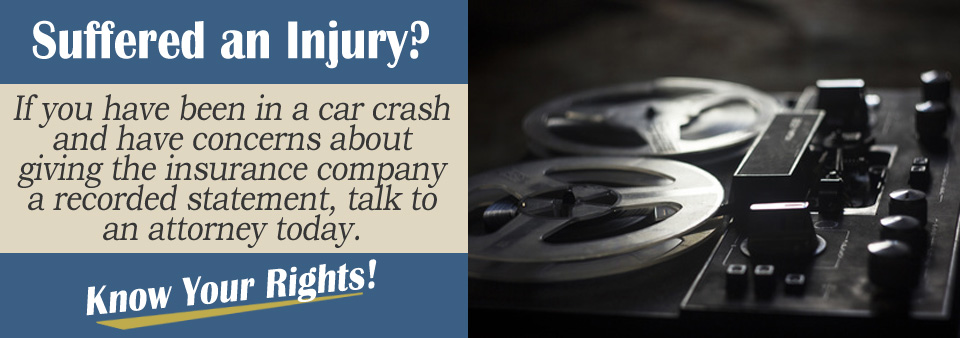Following a car accident, you should expect to be contacted by either your insurance company or the other party’s insurance company, should that person be at-fault for the accident. One common situation many run into is when the insurance claims adjuster asks them to give a recorded statement.
Should you provide one, and if not, what happens if you do not cooperate? We have asked attorney, Alaina Sullivan, about what you should do. Here is what she had to say:
Do You Need to Cooperate?
The first question that comes to many minds is “what happens if I say no?” Do you have to cooperate and give a recorded statement? The answer to this question is “it depends.” If you live in a no-fault state, you are under a duty to cooperate and give a recorded statement.
Further, if the claim is being filed under an uninsured motorist policy, you may also have no choice but to comply. In addition, many insurance policies contain what is known as a “Duty to Cooperate” clause which requires them to cooperate in the investigation of insurance claims.
Under many of these clauses, not cooperating may result in you being denied your claim. However, keep in mind that this is in the event the insurance company wanting your statement is your own. You are not bound to any clauses under the other party’s insurance policy if the other driver is at fault.
What to Do If You Are Forced to Cooperate
If you do choose to decline to give a statement under your own policy, you will need compelling reasons to not give your statement. In most situations, you will be forced to cooperate and provide a statement. However, you can choose when you give that statement.
Do not feel pressured to provide a recorded on that initial call. Tell them you wish to provide a statement but to schedule that at a later date. In the meantime, prepare what you intend to say and get your thoughts straight so you do not do or say anything that will hurt your claim.

Be Careful on What You Say
If you do choose to provide a recorded statement, it is extremely important that you be careful what you say to the claims adjuster. Keep in mind that they are looking out for their bottom line. The less they have to pay, the better.
Many claims adjusters will be creative in how they ask you certain questions, and the purpose of this is to get you to say something that will either weaken your claim or support the fact that you may not need as much compensation as you are saying.
Some of these questions may even come out as concerned statements, such as “It sounds like you were lucky you did not have a more severe injury.” If you agree with them, you are essentially saying your injury was not that severe. Granted, all of this is subjective, but it is important that you do not provide them something that could hurt your case in the end.
How to Prepare
If you choose to give a recorded statement, it is recommended that you prepare an outline of what you intend to say. It is easy to get off-track during the call, and having an outline is important as it will keep you on point, stating the facts you want known.
Stick to the facts. Keep it simple and do not insert anything in there that could be considered complaining or editorializing. Do not add any personal statements to try to explain your statement of mind. Adding personal elements could give information to the adjuster that you were possibly distracted, which could have been a cause for the accident.
One way to keep your story straight is to give the statement of events in chronological order. Do not let the adjuster throw you off your story and ask that he or she ask questions at the end of your statement. If the adjuster asks questions, simply keep going and answer the questions at the end of the statement.
However, you are not obligated to answer their questions. All you are obligated to do at this point is give your statement.
Request Your Own Recording
If you believe you will need your statement later, you have every right to record your statement for your own records. In fact, you have the right to ask the adjuster for a copy of your statement when they are done. That way you are able to go back in the event they try to say that you stated something you did not.
Contact an Attorney Today
If you have been in a car accident and have concerns about giving the insurance company a recorded statement regarding what happened, it is recommended you contact an attorney to ask any questions you may have.
A licensed personal injury attorney will be able to evaluate your case and determine if you have a claim against the other party’s insurance company. To receive the compensation for your medical bills, property damages, and pain and suffering, you should speak with a personal injury attorney in your area today.